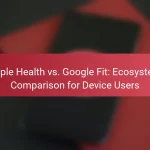Investing in smart health devices can lead to significant savings by promoting preventive care and improving health management. By utilizing wearables and telehealth solutions, individuals can monitor their health more effectively, potentially avoiding expensive medical interventions. These technologies not only encourage healthier habits but also streamline communication with healthcare providers, ultimately contributing to lower long-term healthcare costs.

How can smart devices reduce healthcare costs in the USA?
Smart devices can significantly lower healthcare costs in the USA by promoting preventive care, enhancing patient engagement, and streamlining communication with healthcare providers. By utilizing technology such as wearables and telehealth, individuals can manage their health more effectively, potentially avoiding costly medical interventions.
Wearable health monitors
Wearable health monitors, such as fitness trackers and smartwatches, provide real-time data on vital signs and activity levels. These devices can help users identify health issues early, leading to timely interventions that may prevent expensive treatments later. For example, monitoring heart rate and activity can help manage conditions like hypertension or diabetes.
When choosing a wearable, consider features like heart rate monitoring, sleep tracking, and compatibility with health apps. Popular options include devices from brands like Fitbit, Apple, and Garmin, which typically range from $50 to $300, depending on functionality.
Telehealth services
Telehealth services allow patients to consult healthcare professionals remotely, reducing the need for in-person visits. This convenience can save time and money, as it eliminates travel costs and often results in lower consultation fees. Many insurance plans in the USA now cover telehealth visits, making it a cost-effective option for routine check-ups and follow-ups.
To make the most of telehealth, ensure your device has a reliable internet connection and a camera for video calls. Familiarize yourself with your insurance policy to understand coverage limits and co-pays for telehealth services.
Medication management apps
Medication management apps help users track prescriptions, dosages, and refill schedules, reducing the risk of missed doses or medication errors. By adhering to prescribed regimens, patients can avoid complications that lead to costly hospitalizations. Many apps also offer reminders and alerts, enhancing adherence to treatment plans.
Popular medication management apps include Medisafe and MyTherapy, which are often free or available for a small fee. When selecting an app, look for user-friendly interfaces and features that suit your specific medication needs.

What are the best smart devices for health savings?
The best smart devices for health savings are those that help monitor and improve your health while potentially reducing long-term medical costs. Devices like fitness trackers and smartwatches can encourage healthier habits, leading to fewer health-related expenses over time.
Fitbit Charge 5
The Fitbit Charge 5 is a popular fitness tracker that offers a range of health monitoring features, including heart rate tracking, sleep analysis, and stress management tools. By providing insights into your daily activity levels and sleep patterns, it can motivate you to make healthier lifestyle choices.
With a price typically ranging from $130 to $150, the Fitbit Charge 5 can be a cost-effective investment. Users often report improved fitness levels and better sleep quality, which can lead to reduced healthcare costs in the long run.
Apple Watch Series 8
The Apple Watch Series 8 combines advanced health tracking features with seamless integration into the Apple ecosystem. It includes heart rate monitoring, ECG capabilities, and temperature sensing, making it a robust tool for health management.
Priced around $400, the Apple Watch Series 8 may seem expensive, but its comprehensive health features can help you stay proactive about your health. Regular use can lead to early detection of potential health issues, ultimately saving you money on medical bills.
Samsung Galaxy Watch 5
The Samsung Galaxy Watch 5 offers extensive health tracking, including body composition analysis, heart rate monitoring, and sleep tracking. Its user-friendly interface and compatibility with Android devices make it a strong choice for health-conscious individuals.
Typically priced between $280 and $330, the Galaxy Watch 5 provides valuable insights that can encourage healthier habits. By promoting regular exercise and better sleep, it can help reduce the risk of chronic diseases, leading to potential savings on healthcare costs.

How do smart devices improve health management?
Smart devices enhance health management by providing users with tools to monitor their health metrics in real-time, receive personalized insights, and facilitate remote consultations with healthcare professionals. These capabilities can lead to better health outcomes and potential cost savings over time.
Real-time health tracking
Real-time health tracking allows individuals to monitor vital signs such as heart rate, blood pressure, and glucose levels instantly. Devices like smartwatches and fitness trackers collect data continuously, enabling users to identify trends and make informed decisions about their health.
For example, a person with hypertension can use a smart device to track their blood pressure daily, helping them stay within a healthy range and potentially avoiding costly medical interventions. Regular monitoring can also motivate users to adopt healthier habits, further enhancing their well-being.
Personalized health insights
Smart devices provide personalized health insights by analyzing collected data and offering tailored recommendations. These insights can include suggestions for diet, exercise, and lifestyle changes based on individual health metrics and goals.
For instance, a fitness tracker might recommend specific workouts based on a user’s activity level and fitness goals. This personalized approach can lead to more effective health management, reducing the likelihood of chronic diseases and associated healthcare costs.
Remote patient monitoring
Remote patient monitoring enables healthcare providers to track patients’ health data from a distance, improving access to care and reducing the need for in-person visits. This is particularly beneficial for individuals with chronic conditions who require ongoing management.
Through devices that transmit health data to healthcare professionals, patients can receive timely interventions and adjustments to their treatment plans. This proactive approach can lead to better health outcomes and lower healthcare expenses by preventing complications that require expensive treatments.

What are the long-term financial benefits of using smart devices?
Smart devices can lead to significant long-term financial savings by reducing healthcare costs and improving health management. By monitoring health metrics and encouraging preventive care, these devices can minimize expenses associated with medical treatments and insurance premiums.
Reduced doctor visits
Smart devices, such as fitness trackers and health monitors, can help users keep track of their health metrics, leading to fewer unnecessary doctor visits. For instance, regular monitoring of blood pressure or glucose levels can alert users to potential issues before they require medical intervention.
By staying proactive about health, individuals may find they only need to visit a doctor for routine check-ups rather than frequent consultations, which can save hundreds to thousands of dollars annually in healthcare costs.
Lower insurance premiums
Many insurance companies offer discounts for policyholders who actively engage in health management through smart devices. By demonstrating a commitment to a healthier lifestyle, individuals may qualify for lower premiums, potentially saving 5-20% on their monthly costs.
Additionally, maintaining good health through these devices can lead to fewer claims, which insurers consider when calculating rates. This can create a positive feedback loop, further reducing costs over time.
Improved chronic disease management
Smart devices can significantly enhance the management of chronic diseases by providing real-time data and alerts. For example, a smart insulin pump can help diabetics monitor their blood sugar levels more effectively, leading to better health outcomes and fewer complications.
Effective management of chronic conditions can reduce hospitalizations and emergency room visits, translating to substantial savings. Individuals may save thousands of dollars in medical bills and lost wages by avoiding severe health crises through consistent monitoring and timely interventions.

What factors should you consider when choosing smart health devices?
When selecting smart health devices, consider compatibility with your existing health systems, data privacy, and security. These factors can significantly impact the effectiveness and safety of your health management efforts.
Compatibility with existing health systems
Ensure that the smart health devices you choose integrate seamlessly with your current health systems, such as electronic health records (EHR) or fitness apps. Compatibility can enhance data accuracy and streamline your health monitoring process.
Check for interoperability standards like HL7 or FHIR, which facilitate data exchange between devices and systems. Devices that support these standards can provide a more cohesive health management experience.
Data privacy and security
Data privacy and security are critical when using smart health devices, as they often collect sensitive health information. Look for devices that comply with regulations such as HIPAA in the United States or GDPR in Europe, ensuring your data is handled responsibly.
Choose devices that offer robust encryption and user authentication features. Regularly review privacy settings and understand how your data is stored and shared to minimize risks associated with data breaches.


